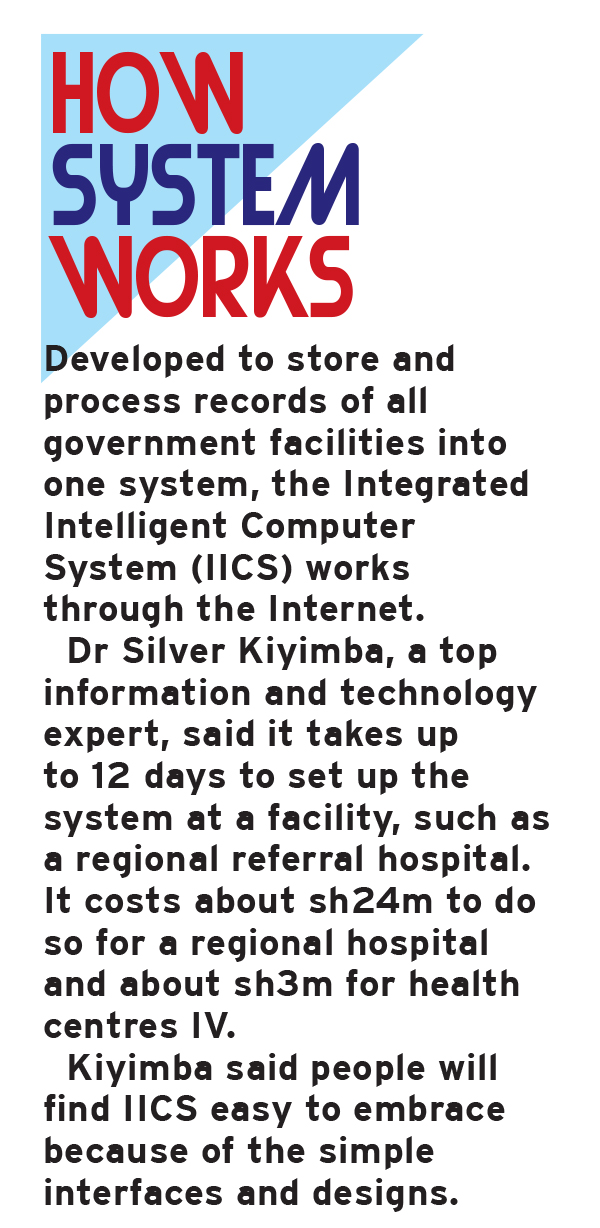New software to fix staff absenteeism, theft in health facilities
IICS is funded through the Presidential Support to Scientists Initiative (PSSI). The total cost of the project is $22.8m (about sh84.6b).
HEALTH | TECHNOLOGY
Dr Silver Kiyimba, a top information and technology expert, has said challenges are slowly easing in Uganda's health sector after the Government rolled out a new software system in many hospitals in the country.
The Integrated Intelligent Computer System (IICS) is co-funded by the government of Uganda, its donor partners and the Global Fund. It has so far been implemented in Moroto, Masaka, Nebbi, Gulu, Mbarara and Mbale regional referral hospitals, as well as Entebbe and Naguru hospitals.
"When we implemented the system at Mulago Hospital in 2013, accountability was 38%, but it has now jumped to 78%. If you look at many hospitals countrywide, we are starting to see things improve," he said.
Kiyimba made the remarks recently while briefing journalists at Vision Group headquarters in Kampala.
IICS is funded through the Presidential Support to Scientists Initiative (PSSI). The total cost of the project is $22.8m (about sh84.6b).
Kiyimba said before its adoption, they carried out research that established many problems bedevilling the health sector. Some of the problems, he said, included poor attendance of health workers, drug thefts, low productivity, and persistent shortage of drugs in hospitals due to constant stock-outs.
"We concluded that a computer system could solve some of the problems," he said.
He added that they set out to address the problem by coming up with a system that manages the entire chain through a central server.
Besides addressing the challenges, it would also enable the Government to harvest data about drug usage and demand of medicine in the health system. It would also capture biometric data of patients, right from the time of arrival at a health facility to the time of their departure. The system would also enable the Government to keep track of drug distribution from the National Medical Stores (NMS) to the end user.
In addition to solving the efficiency gaps, the system also sought to minimise use of paper-based records by digitising systems in a bid to cut operational costs of running hospitals.
"In many hospitals, patients usually come with exercise books in which all the medical records are entered," Kiyimba said.
He added that in the hospitals where the system has been installed, patients no longer have to carry exercise books because the information is now captured and stored in the central system and that it can be accessed by the patient from anywhere in the country at a computer linked to the system.
Currently, paper work costs the health sector sh9b per year and this will reduce by between 80% and 90% when the Government completes installing the software in all health facilities by 2023, according to Kiyimba.
WHAT HOSPITALS SAY
Robert Isabirye, an official at Naguru General Hospital
It makes retrieval of data for analysis easier and quicker. For now, some people have not mastered it, and the network sometimes goes off. However, if a solution is found around those challenges, it will make life a lot easier.
Beatrice Oling, administrator at Entebbe Grade B Hospital
We are looking forward to implementing the software when our time comes.
Dr Celestine Barigye, director Mbarara Hospital
We are in the process of installing computers. The software has several valuable components, including the electronic registration, which is expected to considerably cut down on the amount of time taken, especially in interfacing with both new and repeat patients.
Dr Justine Okwairwoth, District Health Officer, Nebbi
We are in the process of completing the cabling. We hope that when complete, it will bring a lot of benefits, especially in co-ordinating human resource activities. However, there is a problem of unreliable electricity, which could prove a challenge, especially during the dry season. The river from which West Nile receives power dries up.